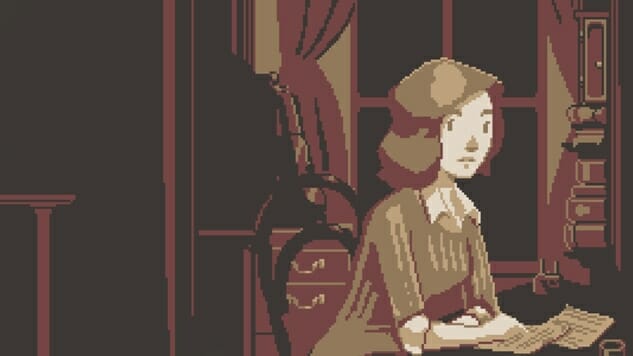
This month marked the release of Mi’pu’mi Games’s The Lion’s Song on Nintendo Switch, a four part choice-based point and click game that takes place in Europe early in the 20th century. A game about choices, and secrets, and the unknown, it ponders the many paths our lives can take if but for the slightest change.
In the first chapter, we meet Wilma, a young composer and musician who lives with her parents and brother, and is under the tutelage of her beloved Arthur, a teacher at her college with whom she is having a secret affair. She travels to the countryside, leaving Vienna to focus on her latest composition, and through some light pixel hunting, we help her piece together each of its working parts, inspired by items found in her environment, from the storm outside, to the flicker of a lamplight, to the steady ticking of a lonely pocket watch. With a random call from the newfangled telephone on her desk, she also comes to have an unexpected but warm friendship with a stranger named Leos, in whom she can confide as she navigates doubts about her music and her life.
The Lion’s Song is comprised of micro-decisions that seem insignificant but carry heavy impact. At the end of the chapter, the player is presented with a screen that summarizes the major choices they made during the story, and the percentage of other players who made the same ones. These moments can be replayed individually and new decisions made, opening up different narrative paths that highlight or give new information, creating a multilayered musing on the complexities of the unknown in our daily lives. The push and pull of those complexities is bittersweet. As Wilma composes her latest masterpiece, she’s plagued not only by self doubt but also by the troubles with her mentor and forbidden paramour Arthur. Helping her navigate her anxiety and confusion is heartbreaking, and exploring the many possibilities in the story equally so.
I felt the weight of this as I reached the end of the first chapter and looked at the choices I’d made. As I reflected on each, I was surprised at the moments considered pivotal in Wilma’s experience. 93% of the other players had also revealed Wilma’s name to Leos. 87% advised Leos to call Nikol, his estranged but beloved niece. When Wilma was troubled by self doubt and could not sleep, 81% tried to push through it, just like me.
Curious as to how the events might change with just a single detail altered, I picked a moment that seemed significant in the chapter, and decided to replay a few decisions. I was satisfied with how I’d left things—Wilma had declared her desire for success, worked through her critical inner voices, and had a great performance. But the game, after all, is about choice. This time, after an ominous dream where a frightened Wilma confronts her subconscious self, I took a more thorough look around the small room where Wilma is composing, finding a stack of letters left behind by Arthur, revealing his infidelity. A predictable but sad turn of events that left me wondering if I’d should have left well enough alone.
I like games that allow you to reflect on the multiple decisions you made and contemplate what might have been. Life is Strange comes to mind; it was interesting to see the percentages reflecting what choices other people made as they played the game and imagine how my playthrough might have gone had I done things differently (with sometimes heartbreaking results). I wonder sometimes if there’s another me in an alternate timeline, benefiting from all the good decisions I never made in this one. Sometimes I think she’s looking out for me, a omniscient future self reaching out from the fourth dimension as an invisible hand guiding me towards the slightly better path in hopes I fuck up just a little less. Maybe there’s multiple copies of me in multiple timelines, all failing or thriving in their unique ways, and when you line them up they form a sliding scale of human suffering. Maybe it’s like the ending of SOMA and I sometimes I just have to be happy for the me that is hurting just a little less somewhere else far away.
At times videogames espouse the sort of omnipotent, well-meaning benevolence you’d see from someone’s mother, or God. There’s a part of me that wanted to protect Wilma both from, and with, what she doesn’t know. And yet, if I hadn’t indulged my curiosity, I would have never been able to gift her with the truth about Arthur. It’s as if I want her to be as happy as the game will allow, but I’m so worried at the possibility of her pain that I’m not willing to take the chance. As a metaphor for my own life it seems familiar. In the end, all this musing and deep thinking is inconsequential; after all, Wilma is just a fictional character in a videogame. But it does remind me of how fragile the illusion of our own happiness can be.
Holly Green is the assistant editor of Paste Games and a reporter and semiprofessional photographer. She is also the author of Fry Scores: An Unofficial Guide To Video Game Grub. You can find her work at Gamasutra, Polygon, Unwinnable, and other videogame news publications.